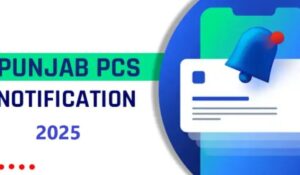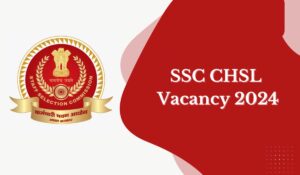Punjab PCS Syllabus 2025 : One of the reputable tests for obtaining civil service positions in the Indian state of Punjab is the Punjab State Civil Services Combined Competitive Examination. The Punjab Public Service Commission (PPSC) has released the Punjab PCS Syllabus 2025 for the 322 positions on its official website, https://ppsc.gov.in/. Applicants who wish to work in the administrative field should take advantage of this opportunity. The candidates should first carefully review the exam structure and the current Punjab PCS syllabus 2025 The Punjab public civil services syllabus and exam pattern are available here.

Punjab PCS Syllabus 2025
This Punjab PCS 2025 syllabus offers helpful information to assist candidates in developing a solid study plan for the test. There are three steps in the Punjab PCS selection process: the preliminary, mains, and interview. Two 200-mark papers with objective (multiple-choice) questions will make up the preliminary exam.
| Punjab PCS Syllabus 2025 and Exam Pattern | |
| Organization Name | Punjab Public Service Commission (PPSC) |
| Exam Name | Punjab Civil Service Combined Competitive Exam-2025 (Punjab PCS) |
| Post Name | Various officer-level posts |
| Vacancies | 322 |
| Category | Syllabus |
| Negative Marking | No Negative Marking |
| Selection Process | Prelims, Mains, Interview |
| Official Website | https://ppsc.gov.in/ |
Punjab PCS Syllabus 2025 Selection Process
Preliminary exam, main exam, and personal interview round are the three main steps in the Punjab PCS selection process. The first step is the preliminary exam, which consists of multiple-choice objective questions and is a screening test. The final merit list does not take the preliminary exam scores into account. After passing the first round, candidates will be invited to take the main exam and then the round of in-person interviews. The candidates’ scores from the mains and interview rounds will determine the final merit list.
- Preliminary Competitive Examination
- Main Competitive Examination (written and Interview)
Punjab PCS Prelims Schedule
Learn about the subjects, total number of questions, marking scheme, total marks, and exam duration of the Punjab PCS exam pattern 2025 before you begin your preparation.
Read More…….SBI Clerk Prelims Admit Card 2025 Released by 10th Feb Check Now
Exam Pattern for Punjab PCS Prelims 2025
The two 200-mark papers that make up the Punjab PCS preliminary exam 2025 will include multiple-choice, objective-type questions. With the exception of language proficiency questions, the exam will be available in both Punjabi (written in Gurmukhi script) and English.
- There will be multiple-choice, objective-type questions in both papers.
- The written preliminary exam test will not be subject to negative marking.
- The CSAT exam will have a minimum cutoff score of 40% and be qualifying in nature, with no negative marking.
- Paper I (General Studies) will be used to determine the preliminary exam’s merit.
- Each paper for the preliminary exam will take two hours to complete.
- Candidates with disabilities, however, will have an extra forty minutes for each paper.
| Paper | Subject | Total Questions | Marking Scheme | Total Marks | Time Duration |
| Paper 1 | General Studies | 100 | 2 marks for each correct answer | 200 | 2 hours |
| Paper 2 | Civil Services Aptitude Test (CSAT) | 80 | 2.5 marks for each correct answer | 200 | 2 hours |
The Punjab PCS Prelims Exam 2025 syllabus
The two papers in the Punjab PCS preliminary exam are the Civil Services Aptitude Test (paper II) and General Studies (paper I). While the scores from Paper I (General Studies) will be taken into consideration for selection in the next step, the mains exam, Paper II (Civil Services Aptitude Test) is qualifying in nature.
The syllabus for Punjab PCS General Studies-I Table-1
Everyday Science, Environmental Studies, Political Theory & International Order, Indian Politics, History of India, Indian Economy, and Geography are among the subjects covered in Punjab PCS Prelims Paper I, General Studies I.
| Punjab PCS General Studies-I | |
| Subjects | Topics |
| Everyday Science | States of matter, structure of atoms, versatile nature of carbon Acids, bases, salts, corrosion in metals, action of soaps Life on Earth: evolution, marine & terrestrial life Human body and life processes, nutrition, disease—its causes & prevention, infectious diseases, lifestyle diseases Public health initiatives, mother and child health, immunization & vaccination, HIV-AIDS, TB, polio Force-laws of motion & gravitation, Archimedes principle Energy kinetics & potential Light—reflection & refraction—concepts and applications. Sound: propagation & reflection—concepts and applications. Electric current: concepts and applications Computers and telecommunications: concepts and applications |
| Environmental studies | Composition and structure of the atmosphere. Solar system: heat balance & temperatureAtmospheric circulation & weather system, water cycleClimate change: fossil fuels, greenhouse gases, renewable energy, clean development mechanisms, carbon credits.Water: oceans, rivers, glaciers, lakes, groundwater, etc. Biodiversity & conservationSoil: types, crops, food chain, etc. Pollution and toxicity |
| Political Theory & International order | Basic concepts of freedom, equality, social justice, rights & duties, citizenship, nationalism, secularism, etc. United Nations and its organs/agencies, other international organizations like the World Bank, IMF, WTO, EU, G20, BRICS, etc. and their role in world peace, trade, & development. |
The syllabus for Punjab PCS General Studies-I Table-1
| Indian Polity | Basic features, provisions, schedules of the Indian Constitution, key amendmentsPanchayati Raj. Elections—People’s Representation Act, electoral reforms. Rise of regionalism and coalition politicsArmed challenges to the Indian state since independence |
| History of India | The Indus Valley Civilization The Aryan and the Vedic age. Jainism and Buddhism The Maury and Gupta periods The advent of Islam and Sultanate period (political, social, & cultural). The Bhakti Movement The Mughals (political, social, & cultural till Aurangzeb)The coming of the European powers and the advent of British rule. The Mutiny of 1857The British rule and the Indian National Movement (1857–1947) |
The syllabus for Punjab PCS General Studies-I Table-2
| World History | The Renaissance and the Industrial Revolution in Europe. The American Revolution 1776The French Revolution, 1789The Russian Revolution 1917World Wars I & II |
| Indian Economy | Indian economic development (1950-1991): key economic policies, public sector dominance, bank nationalization, etc Five-year plans: key goals and main achievements Liberalization, privatization and globalization era since 1991: key policies, decisions and results Performance of Indian economy since 1991: growth, fiscal & revenue deficits, trade, commerce & balance of payments, inflation, growth of service sector Key challenges and responses: agriculture and food security, industrialization, poverty alleviation & employment, rural & urban infrastructure, social sector (health, education, etc.) |
| Geography | Population: distribution, density, growth, and comparison. Migration: types, causes and consequences Human development. Human settlements. Land resources and agriculture Water resources Mineral and energy resources. Manufacturing industries Planning and sustainable development in India. Transport and communication International trade Geographical perspective on selected issues and problems |
| Punjab-related | Geography: Geographical and Agro-climatic regions, rivers, water resources, sharing of waters, demographics, human development indices People, Society, and Cultur3: Major personalities in history of Punjab, religious movements, major religions & spiritual personalities, Punjabi literature, folk or performing arts, fine arts and crafts History: Sufis, saints and gurus, Lodhis and Mughals, Sikh rulers, the British period, nationalist movement in Punjab, Punjab in independent India Economy: Agriculture, animal husbandry, industrial & service sectors, major occupations, development & economic growth, public finance (including central-state fiscal issues), public sector institutions, cooperatives, etc. |
| Current Events of national and international importance | |
The syllabus for Punjab PCS Prelims Paper II
The Punjabi and English languages are covered in this section, along with topics like reading comprehension, logical reasoning, interpersonal skills, and basic numerical skills. These include numbers, magnitudes, percentages, the appreciation of numerical relationships, and data analysis, including graphic presentations, charts, and more.
| Paper | Topics |
| Civil Services Aptitude Test | Reading comprehension; Punjabi and English language comprehension, antonyms and synonyms, grammar, and sentence formation Interpersonal skills, including communication skills Logical reasoning, analytical and mental ability Basic numerical skills; numbers, magnitudes, percentages, numerical relation appreciation Data analysis: graphic presentations, charts, tables, and spreadsheets |
The 2025 Punjab PCS Mains syllabus
There are seven papers in the Punjab PCS Mains examination. Two of the seven required papers—Punjabi (in Gurumukhi script) and English—are based on the 12 standard and are mandatory. Essay and the General Studies I, II, III, and IV papers make up the remaining papers. We have included each paper’s details here.
Exam Pattern for Punjab PCS Mains in 2025
- Punjabi, English, essay, General Studies Paper I, General Studies Paper II, General Studies Paper III, and General Studies Paper IV are the seven papers that make up the Punjab PCS mains exam.
- English and Punjabi are the two require subjects out of the seven; each is worth 100 points.
- Essay papers are worth 150 marks, while General Studies papers I, II, III, and IV are worth 250 marks each.
- Those who made it through the main exam will be invited to the 150-point interview round.
| S. No. | Name of Paper | Maximum Marks |
| 1 | Punjabi (in Gurumukhi Script) Compulsory (of 12 Standard) | 100 |
| 2 | English Compulsory (of 12 standard) | 100 |
| 3 | Essay | 150 |
| 4 | General Studies Paper-I (History, Geography and Society) | 250 |
| 5 | General Studies Paper-II (Indian Constitution & Polity, Governance and International Relations) | 250 |
| 6 | General Studies Paper-III (Economy, Statistics and Security issues) | 250 |
| 7 | General Studies Paper-IV (Science & Technology, Environment, Problem Solving and Decision Making) | 250 |
| 8 | Interview | 150 |
| Total Marks | 1500 |
Punjab PCS Mains Exam 2025
syllabus The section below covers the syllabus for every subject covered in the Punjab PCS Mains Exam.
Paper in English
There are two sections and 100 marks on the Punjab PCS English Language exam. English grammar is cover in section B, while precise writing, essay writing, translation, grammar, letter writing, and comprehension are cover in section A. The table below shows the distribution of marks for each section.
| Section | Topics | Total Marks |
| Section-A | Comprehension (Unseen Passage) (An unseen passage followed by Questions to be answered) | 10 Marks |
| Precis writing (Passage to be summarized to 1/3rd) | 10 Marks | |
| Letter writing (200 words) | 10 Marks | |
| Essay writing (Any general topic 300 words) | 10 Marks | |
| Translation | 10 Marks | |
| Section-B | Grammar | 50 Marks |
| Total | 100 Marks |
Language Paper in Punjabi
Unseen Paragraphs, Synopsis, Application, Essay Composition, Translation, and Grammar are among the topics and subtopics covered in the 100-mark Punjabi Language Paper for the Punjab PCS exam. Candidates must compose three brief essays on predetermined subjects in either Punjabi or English. The selection of topics will be provided. Grammar is worth fifty marks, while each topic is worth ten.
| S. No. | Topics | (Marks) |
| 1 | Comprehension Passage (Read the passage and answer the questions) | 10 marks |
| 2 | Summary Writing (Write a summary using the given title within the prescribed word limit) | 10 marks |
| 3 | Application or Letter in 200 Words | 10 marks |
| 4 | Essay Writing (Within 400 Words) | 10 marks |
| 5 | Translation | 10 marks |
| 6 | Grammar | 50 marks |
| Total Marks | 100 Marks | |
Punjab PCS Mains General Studies Paper I Syllabus Paper I.
History, geography, and society are among the topics cover
| Punjab PCS Mains General Studies Paper I Syllabus | |
| Subjects | Topics |
| History | History of the world: Events from 18th century; industrial revolution, world wars, redrawal of national boundaries, colonization, decolonization, political philosophies like Communism, Capitalism, Socialism Indian culture- Salient aspects of Art Forms, Literature and Architecture from ancient to modern times Modern Indian history from the middle of the eighteenth century until the present significant events, personalities and issues Socio-religious reform movements with special reference to Punjab The Freedom Struggle – its various stages and important contributors /contributions from different parts of the country with special reference to Punjab Post-independence consolidation and reorganization within the country History of Punjab: Ranjit Singh’s rise to power, civil and military administration and relations with the British, Annexation of Punjab with special reference to the causes and consequences of the Anglo-Sikh wars |
| Geography | Physical Geography: Salient features of the world’s physical geography. Distribution of key natural resources across the world (including South Asia and the Indian subcontinent); factors responsible for the location of primary, secondary, and tertiary sector industries in various parts of the world (including India)Important Geophysical phenomena such as earthquakes, Tsunami, Volcanic activity, cyclones etc., geographical features and their location- changes in critical geographical features (including water-bodies and ice-caps) and in flora and fauna and the effects of such changes Geography of Punjab: Physiographic details of Punjab; Geomorphic features of Punjab, Punjab’s strategic location with reference to International Border Crops of Punjab; Modern concepts of Farming; Problems faced by Agriculturists/ Issues in Agriculture: Depletion of groundwater |
Punjab PCS Mains General Studies Paper I Syllabus Paper I.
| Society | Salient Features of Indian Society, Diversity of India Role of women and women’s organization, population and associated issues, poverty and developmental issues, urbanization, their problems and their remedies Effects of globalization on Indian society Social empowerment, communalism, regionalism & secularism Ethics and Society: Essence, determinants and consequences of Ethics in human actions; dimensions of ethics; ethics in private and public relationships Human Values – Role of family, society and educational institutions in inculcating values; lessons from the lives and teachings of great leaders and reformers- Gautam Buddha, Mahavira, Kabir, Guru Nanak; Swami Vivekananda, Jyotibha Phule, Ishwar Chandra Vidya Sagar and Mahatma Gandhi Vulnerable sections of the population – Welfare schemes by the Centre and State of Punjab and their performance; Mechanisms, laws, institutions and Bodies constituted for their protection and betterment Issues relating to the development and management of the Social Sector- Health, Education, and Human Resources; Issues relating to Poverty and Malnutrition |
Punjab PCS Mains General Studies Paper II Syllabus
| Punjab PCS Mains General Studies Paper II Syllabus | |
| Subjects | Topics |
| Indian Constitution & Polity | Indian Constitution- historical underpinnings, evolution, features, amendments significant provisions and basic structure Functions and responsibilities of the Union and the States, issues and challenges pertaining to the federal structure, devolution of powers and finances up to local levels and challenges therein Separation of powers between various organs; Dispute redressal mechanisms and institutions Comparison of the Indian constitutional scheme with that of other countries Parliament and State Legislatures – structure, functioning, conduct of business, powers & privileges and issues arising out of these structure, organization and functioning of the Executive and the Judiciary; Ministries and Departments of the Government; pressure groups and formal/informal associations and their role in the Polity Salient features of the Representation of People’s Act Appointment to various Constitutional posts; Powers, functions and responsibilities of various Constitutional Bodies District Administration – Evolution of District Administration; Panchayati Raj Institutions and Urban Local Bodies |
Punjab PCS Mains General Studies Paper II Syllabus
| Governance | Statutory, regulatory and various quasi-judicial bodies Government policies and interventions for development in various sectors and issues arising out of their design and implementation; Development processes and the development organizations- the role of NGOs, SHGs, donors, charities, institutional and other stakeholder Important aspects of governance, transparency and accountability, e-governance applications, models, successes, limitations and potential; citizens charters, transparency & accountability and institutional and other measures; Role of civil services in a democracy; Changing trends in Governance Values and Ethics in Governance- Ethical concerns and dilemmas in government and private institutions; laws, rules, regulations and conscience as sources of ethical guidance; accountability and ethical governance; strengthening of ethical and moral values in governance; ethical issues in international relations and funding Probity in Governance: Concept of Governance; Philosophical basis of governance and probity; corporate governance; Information sharing and transparency in government, Right to Information, Codes of Ethics, Codes of Conduct, Citizen’s Charters, Work culture, Quality of service delivery, Utilization of public funds, challenges of corruption |
| International Relations | India and its neighborhood- relations; Bilateral, regional and global groupings and agreements involving India and/or affecting India’s interests Effect of policies and politics of developed and developing countries on India’s interests, Indian Diaspora Important International institutions, agencies and forum- their structure and mandate. |
Punjab PCS Mains General Studies Paper III Syllabus
The third paper covers topics such as the Indian economy, security issues, and the Punjabi economy. Planning issues, major crops, cropping patterns, land reforms in India, employment trends in India, skill development and the demographic dividend, infrastructure (energy), ports, roads, airports, railways, etc. are among the topics cover.
| Punjab PCS Mains General Studies Paper III Syllabus | |
| Subjects | Topics |
| Indian Economy | Issues relating to planning, mobilization of resources, growth, development and employment; sustainable development; Inclusive growth and issues arising from it; Government Budgeting. Major crops, cropping patterns in various parts of the country, different types of irrigation and irrigation systems; storage, transport and marketing of agricultural produce- issues and related constraints; e-technology in the aid of farmers; Issues related to direct and indirect farm subsidies and minimum support prices; Technology missions; economics of animal rearing Public Distribution System- objectives, functioning, limitations, revamping; issues of buffer stocks and food security; Food processing and related industries in India- scope and significance, location, upstream and downstream requirements, supply chain management Land reforms in India; Effects of liberalization on the economy, changes in industrial policy and their effects on industrial growth Infrastructure- Energy, Ports, Roads, Airports, Railways Human Resource Development: Importance of Human capital in economic development, Nature, types and problems of unemployment in India, Trends of Employment in India, Skill Development and demographic dividend |
Punjab PCS Mains General Studies Paper III Syllabus
| Punjab Economy: Planning Statistical analysis, graphs and diagrams | This part will test the candidate’s ability to draw conclusions from information presented in the statistical, graphical or diagrammatical form and to interpret the same. |
| Issues related to Security | Linkages between development and spread of extremism; Role of external, State and non-state actors in creating challenges to internal security; Challenges to internal security through communication networks; role of media and social networking sites in internal security challenges Basics of cyber security; money-laundering and its prevention; Security challenges and their management in border areas; linkages of organized crime with terrorism Various Security forces and agencies and their mandate |
Punjab PCS Mains General Studies Paper IV Syllabus
Science and technology, the environment, and problem-solving and decision-making are some of the topics cover in this paper. Subtopics such as Intellectual Property Rights Issues, Introduction to Genetic Engineering and Its Applications, and Stem Cell Research will be cover in Science and Technology.
| Punjab PCS Mains General Studies Paper IV Syllabus | |
| Subjects | Topics |
| Science and Technology | Developments and applications of science and technology and their effects on everyday life Achievements of Indians in science & technology; indigenization of technology and development of new technology Recent developments in the fields of IT, Space, Computers, robotics, nanotechnology, etc Issues relating to intellectual property rights Modern Trends in Life Sciences Progress of Agricultural Science and its impact– Introduction to Biotechnology and its applications; Veterinary and Animal Sciences- latest developments Introduction to and Applications of Genetic Engineering & Stem Cell Research Human Diseases and Microbial infections; Common infections and preventive measures; preventive measures during out breaks; Immunity and vaccination |
Punjab PCS Mains General Studies Paper IV Syllabus
| Punjab PCS Mains General Studies Paper IV Syllabus | |
| Subjects | Topics |
| Science and Technology | Developments and applications of science and technology and their effects on everyday life Achievements of Indians in science & technology; indigenization of technology and development of new technology Recent developments in the fields of IT, Space, Computers, robotics, nanotechnology, etc Issues relating to intellectual property rights Modern Trends in Life Sciences Progress of Agricultural Science and its impact– Introduction to Biotechnology and its applications; Veterinary and Animal Sciences- latest developments Introduction to and Applications of Genetic Engineering & Stem Cell Research Human Diseases and Microbial infections; Common infections and preventive measures; preventive measures during out breaks; Immunity and vaccination |
| Environment | Conservation, environmental pollution and degradation, Issues related to Climate change; environmental impact assessment Water management- Issues in India; Present scenario, Methods and importance of water conservation Definition, nature, types and classification of disasters Natural Hazards: Floods, earthquakes, tsunamis, landslides, etc., Risk reduction and mitigation measures |
| Situations in Civil Service -Problem Solving and Decision Making | Tackling situations of Natural disasters, Major Accidents and Law and order, Controlling riots, Handling public protests, Land Acquisition and Rehabilitation, Designing Projects Implementation of National Flagship Schemes and Programmes, Public Private Partnership in effective service delivery, Managing and financing Municipal services e.g. Solid waste management, Conservation of natural resources- water, forests Pollution control, Reviving a loss-making PSU, Planning and target achievement, Gender sensitization and women empowerment Empowerment of vulnerable sections of the society Improving Education and Enhancing Skill development, Urban settlement-Slums and Housing issues Managing Issues related to Urban/ Rural drinking water supply and sanitation |





